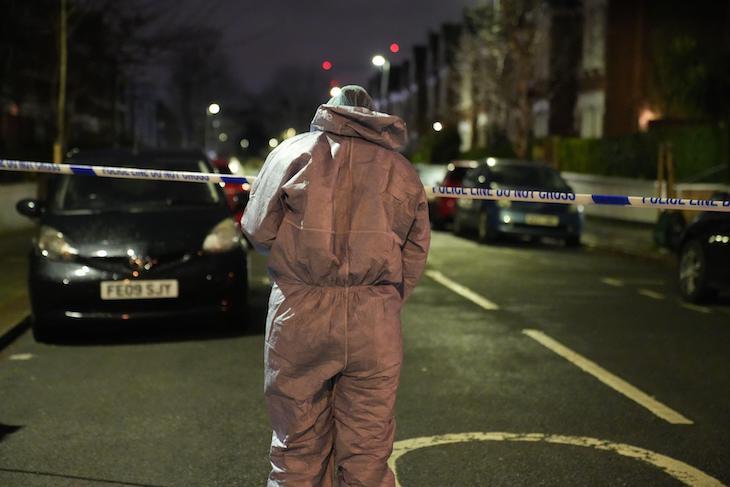Here’s my question about Abdul Ezedi, the suspect in the Clapham chemical attack: what the hell was he doing in this country? He came here from Afghanistan by illegal means. He was twice turned down for asylum. And in 2018, at Newcastle Crown Court, he was found guilty of sexual assault. And yet despite all that he was later granted asylum, after a priest vouched that he had converted to Christianity.
Now this supposed Christian stands accused of repaying the witless charity of our nation by allegedly carrying out one of the grimmest crimes imaginable: dousing a mother and her two daughters with a corrosive substance. The injuries sustained by the mum and the youngest girl, who is just three, are said to be ‘life-changing’.
Human depravity doesn’t go much lower than this
Let’s be clear: this was an act of evil. To throw chemicals at women and girls is to betray every moral standard of civilised society. Human depravity doesn’t go much lower than this.
This will surely be a wake-up call. It will surely arouse people from their moral slumber on the issue of asylum. No more writing people off as ‘racist’ if they query the asylum system. No more branding voters as ‘bigots’ if they ask what’s being done to secure our borders. No more bandying about the cheap insult of ‘Islamophobia’ against anyone who worries about an influx of young men from a country like Afghanistan. No, we now need a grown-up, insult-free and frank discussion about what is going on in 21st-century Britain.
It is not racist to ask why Ezedi was in the UK. It is not racist to ask why a man who illegally snuck into Britain in a lorry and was later convicted of sexual assault was granted asylum. It is not racist to ask why he wasn’t kicked out the minute it was established that he had sexually assaulted someone, on the basis that if you fail to respect the safety and dignity of women and girls, then you are not welcome here.
It is not racist to point to the myriad social problems that have flowed from the influx of migrants from the Middle East into Europe in recent years. Gang violence in Sweden, the street harassment of women in France, even acts of terrorism: all have involved asylum seekers.
Was Magdalena Andersson, the then Social Democratic prime minister of Sweden, being racist in 2022 when she said there are now ‘parallel societies in Sweden’ because ‘integration has been too poor at the same time as we have had a large immigration’? Of course not. She was simply addressing the spike in crime and spread of communal separatism that followed the migrant crisis of 2015. It is not racist to talk about these things – it is reckless to refuse to talk about them.
The problem we face today is that a vast infrastructure of censure has been built to curb discussion about immigration. The charge of ‘hate speech’ is levelled at anyone who dares to say we should have tighter oversight over who comes into the country. People’s discomfort with our seemingly porous borders is damned as a species of ‘bigotry’.
Asylum is now treated less as a straightforward policy issue that everyone should have a say on than as a means of moral distinction. Being pro-asylum is one of the chief ways that the chattering classes distinguish themselves from the masses, the gammon, the tabloid-reading hordes with their alleged ‘far right’ tendencies. This hyper-moralisation of asylum makes it even more difficult to discuss it in cool, factual terms.
We end up in a situation where even the presence in Britain of a foreign-born sexual offender who has now allegedly poured chemicals on a mother and her daughters is something we feel antsy about discussing. Will I be slammed as a xenophobe if I get angry about this, many are no doubt wondering?
Will the horrors in Clapham give pause for thought to our political elites? Make them wonder if perhaps it’s time to dismantle the empire of censorship and permit honest, free discussion about the immigration system? The signs are not good.
Witness Conservative MP Caroline Nokes on Newsnight last night talking about the ‘microaggressions’ that women like her face. She complained that the media is too dismissive of this supposed scourge. ‘Some of us do want to hear about microaggressions!’, Kirsty Wark assured her.
"Every day women will face misogyny and microaggressions… We have to do better,"
— BBC Newsnight (@BBCNewsnight) February 1, 2024
Caroline Nokes, Chair of the Women and Equalities Committee, tells @KirstyWark more needs to be done to change the culture on abusive behaviour towards women. #Newsnight pic.twitter.com/Xcxh6ilLgY
No we don’t. A woman and her daughters are in hospital suffering savage burns and you want us to blub about the time some bloke in parliament rolled his eyes at Nokes? Can these people hear themselves? The moral detachment of the elites from the concerns of everyday people has never been greater. They’re worried about being called ‘love’, we’re worried about the presence in our country of a convict who now stands accused of visiting unthinkable violence on a woman and two girls.
The Clapham attack should have us asking some probing questions about the ruling class. About their unworldliness, their blithe disregard for life as it is really lived, their luxurious obsession with the ridiculously minor problems they face in the professional world over the far more serious problems confronted by the rest of us. Problems which, very often, were inflicted on us by them.
Regardless of whether Ezedi was responsible for the attack, he should not have been granted asylum. It’s someone’s fault that he was. We need to find out whose.







Comments